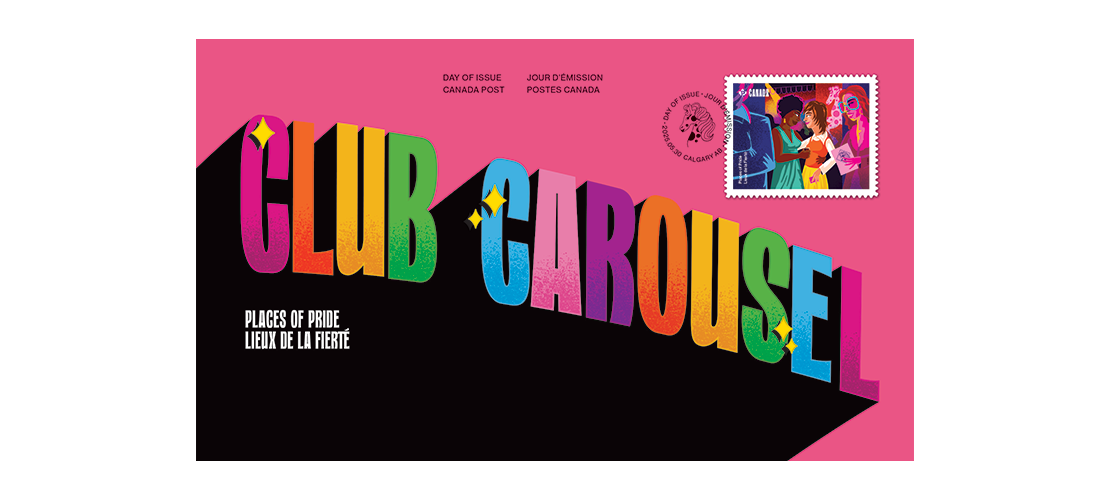In early 1970, Calgary’s queer community faced a difficult reality. Homophobic violence and discrimination was all too common, and finding safe spaces to connect, celebrate and simply exist was nearly impossible. That began to change on March 20th, 1970, when Club Carousel opened its doors.
“Club Carousel was the only place in Calgary for gay people in those years,” says Lois Szabo, one of the founding members of Calgary’s iconic gay bar. A formative queer space, Club Carousel was both innovative and transformative. Though it closed long ago, it has left a lasting legacy as a members-only space, where the community could feel safe from homophobia, repression and intimidation. Now, it is one of four locations honoured in Canada Post’s latest stamp issue, “Places of Pride,” which recognizes and honours spaces across the country that Canada’s queer community fought hard to make their own.
When Szabo came out as gay in 1964, she recalls it was virtually impossible to find a community of like-minded people. So she set out to create one. Along with local activist, Jack Loenen, they found a spot for rent, what Szabo remembers as “a dirty, dingy hole in a basement of a building in Calgary.” After a lot of cleaning and painting, the club opened on March 20th, 1970. Among those who came to the club on opening night were the police, who said the club had to shut its doors immediately. “We ignored them,” Szabo tells Canada Post, “and we just opened the next night.”
The club began with 20 members and quickly established itself as a lively beacon where members could bring their own drinks and dance the night away to the sounds coming from the club’s jukebox. But it was far more than a place to let loose. It became a central hub for queer folk in Calgary.

From the very beginning, Szabo and Loewen established a non-profit charter and “members-only” policy that restricted access to the bar and helped protect clubgoers from harassment from the outside world.
“The main focus of the club was to provide privacy for our members,” Szabo says. “Because it was a really dangerous time those days.” Constant targets of homophobia, she remembers the horrific treatment local queer populations were receiving at the time, which included frequent physical assaults – and worse.
“That’s why the club was so essential,” she continues, “because there was nowhere else for people to get together and dance and enjoy themselves. They were always looking over their shoulder.”
The club’s members-only policy was quickly replicated across the Prairies. Their determination and dedication made a lasting impact, and the club, which was eventually listed in Gay Guides (an underground, globally published listing of safe spaces), soon became a destination for queer visitors from around the world.
By the time Club Carousel closed its doors in the late 1970s, its membership had grown from 20 to nearly 700 people. Its legacy lives on. In 2021, the city of Calgary named a green space at the northeast corner of 9th Street and 16th Avenue S.W. the “Lois Szabo Commons.”
“The gay history of Calgary,” adds Szabo, “is very important – not only for the young people coming up, but also for the older people to realize that we’ve been here all along and they just didn’t acknowledge us. Now it’s time that they did.”

Stamp release pays homage to Calgary’s iconic Club Carousel
Available now